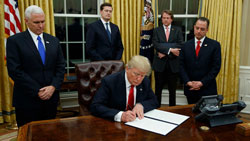 Since taking office on Friday, President Donald Trump has been working hard to fulfill some of his promises to “Maker America Great Again” and signed several executive orders that affect both national and world wide situations.
Since taking office on Friday, President Donald Trump has been working hard to fulfill some of his promises to “Maker America Great Again” and signed several executive orders that affect both national and world wide situations.
The first 100 days of a new president’s term is crucial to the term. What the president does, or does not do, set the standard of how they are viewed by the public. Yes, first impressions do matter.
When Franklin D. Roosevelt took office, he reshaped the decline of America’s economy, passed 76 laws and 9 executive orders. Since then, ghost of “100 days” has lingered through all presidential terms.
The first executive on Trump’s agenda was to withdraw from the Trans-Pacific Partnership free-trade negotiations, which was one of Obama’s signature trade deals. Although the trade deal had not been fully approved by Congress, the fact that President Trump scratched it off completely suggests that his administration is staying true to taking a more aggressive stance on foreign competitors.
President Trump heavily criticized the partnership several times during his campaigns last year and claimed it was a bad deal for American workers.
According to The New York Times, “The president’s withdrawal from the Asian-Pacific trade pact amounted to a drastic reversal of decades of economic policy in which presidents of both parties have lowered trade barriers and expanded ties around the world. Although candidates have often criticized trade deals on the campaign trail, those who made it to the White House, including former President Barack Obama, ended up extending their reach.”
Another executive order that President Trump signed was to order a hiring freeze of federal employees, excluding the military. This executive order comes with no surprise since this was part of his campaign’s “Contract with the American Voter,” and to “drain the swamp” of corruption in D.C.
Monday during his first press briefing, White House press secretary, Sean Spicer, said “We’ve got to respect the American taxpayers.” The administration, he explained, thinks that many Americans are seeing their tax money get wasted. “Some people are working two, three jobs just to get by. And to see money get wasted in Washington on a job that is duplicative is insulting to the hard work that they do to pay their taxes.”
The third executive order that President Trump signed was an anti-abortion executive order, that prohibits giving U.S. funding to international nongovernmental organizations that offer or give advice on a wide range of family planning and reproductive health options.
The U.S spent about $600 million a year on international assistance of family planning and reproductive health programs, according to the Guttmacher Institute. Over 27 million women and couples were able to have access to contraceptive services and supplies.
This executive order could have several implications and could be deadly to women and girls in developing countries. According to the World Health Organization, it estimates that “more than 21 million women a year have unsafe abortions in developing countries, accounting for 13 percent of all maternal deaths.”
Natorye Miller, senior communication student, said, “If these are the first things he does in office, I can only imagine what is going to take place in the next four years. It is going to be scary to see how this man in office affects both our countries, and others around the world.”
President Trump gave the public insight into his views and promises during his Inauguration Address. “We must protect our borders from the ravages of other countries making our products, stealing our companies and destroying our jobs,” he said. “Protection will lead to great prosperity and strength.”
IMAGE TAKEN from FiveThirtyEight.com


